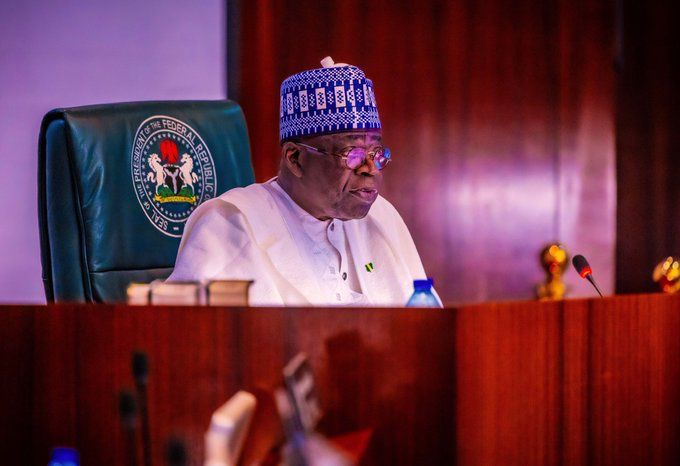Setting the Course for Progress: Recommendations from President Bola Ahmed Tinubu’s Ministerial Retreat

Setting the Course for Progress: Recommendations from President Bola Ahmed Tinubu’s Ministerial Retreat
Introduction
Following the inaugural Ministerial retreat under President Bola Ahmed Tinubu’s administration, a series of recommendations have emerged to pave the way for the seamless realization of the Renewed Hope vision. These recommendations, spanning administrative processes, policies, and priorities, reflect a commitment to fostering inclusive growth and sustainable development in Nigeria. This blog post delves into the key recommendations to shed light on the strategic roadmap envisioned by the administration.

Administrative Processes: Enhancing Efficiency and Transparency
- Approval Threshold and Bidding Processes:
- The government is urged to raise the approval threshold for public procurement.
- Encouragement for open bidding of contracts to enhance transparency.
- Cabinet Procedures:
- Cabinet members are advised to submit memos in advance for analysis before Federal Executive Council (FEC) meetings.
- Enhance alignment of MDAs’ budgets with the president’s vision, strategic goals, and key performance indicators (KPIs).
- Appointment Criteria and Information Flow:
- Formulate a standardized checklist for ministerial and agency head appointments.
- Allow ministers presenting memoranda at FEC to be accompanied by their permanent secretaries for streamlined information flow.
- Evaluation and Consequences:
- Evaluate the efficiency of past federal government intervention programs.
- Define consequences and expedite the prosecution of individuals, including lawmakers, who fail to complete awarded contracts.
Policies and Priorities: Nurturing the Renewed Hope Agenda
- Economic Reforms:
- Initiate reforms to deliver sustained inclusive growth.
- Reform tariff structures to facilitate trade while supporting domestic production.
- Financial Operations:
- Prioritize equity financing over debt financing for fiscal operations.
- Ensure annual budgets align with strategic priorities.
- Security Measures:
- Strengthen national security for peace and prosperity.
- Address revenue leakages in the police force.
- Collaborative Approaches:
- Engage with governors to enhance security at local government levels.
- Foster collaboration and collective approaches at the state level to address security challenges in coordination with the federal government.
- Information Sharing and Environmental Initiatives:
- Develop effective information gathering and sharing mechanisms between states, communities, and the federal government.
- Prioritize the cleanup of Ogoni communities.
- Intensify efforts to combat coastal erosion.
- Agricultural Advancements:
- Boost agriculture for enhanced food security.
- Utilize technology to increase agricultural yield.
- Combat post-harvest losses through investments in storage and value addition.
- Energy and Natural Resources:
- Develop a 10-year plan to increase power generation capacity.
- Establish a super grid aligned with national generation targets.
- Overhaul the structure and coverage of distribution companies.
- Revitalize the roadmap for the steel industry.
- Engage with OPEC to increase Nigeria’s crude oil production quota.
- Education, Health, and Social Development:
- Focus on education, health, and social development as pillars of overall development.
- Open up the sports sector for business by attracting infrastructure, incentives, and investments.
- Accelerate the attainment of universal health coverage.
President Bola Ahmed Tinubu’s Ministerial Retreat has set the stage for a comprehensive and collaborative approach to address Nigeria’s challenges and foster sustainable development. These recommendations underscore the administration’s commitment to transparency, efficiency, and inclusive growth, signaling a renewed hope for a prosperous future in Nigeria.

Enhancing Government Procurement: A Closer Look at Approval Thresholds and Open Bidding Processes
Effective government procurement is a crucial component of economic governance, impacting transparency, efficiency, and fiscal responsibility. In recent deliberations, key recommendations have been made regarding approval thresholds and the adoption of open bidding processes. This blog post delves into the significance of these aspects in the context of good governance and accountable public spending.
Also Read And Dowload
- Sabbin Wakokin Dauda kahutu Rarara Audio Mp3.
- Sabbin Wakokin Nura M Inuwa 2023 Audios.
- Sabbin Wakokin Hamisu Breaker Audios Mp3
- Sabbin Wakokin Kawu Dan Sarki Audios 2023.
- Sabbin Wakokin Sani Ahmad Audio Mp3.
- Sabbin Wakokin Salim Smart Audio 2023
- Sabbin Wakokin Sadiq Sale Audio Mp3.
- Sabbin Wakokin Auta Mg Boy Audios Mp3.
- Sabbin Wakokin Auta Waziri Audio Mp3.
- Sabbin wakokin Garzali Miko Audios Mp3.
- Sabbin Wakokin Umar M Sharif Lokaci Yayi Album official Audios Mp3.
- Sabbin wakokin Dan Musa Gombe Audios Mp3.
- Sabbin Wakokin Hussaini M Pizzah Audio Mp3.
- Sabbin Wakokin Umar M Sharif Audios 2023.
- Sabbin Wakokin Ado Gwanja Audios 2023.
- Sabbin Wakokin Ahmad Fasaha Audios Mp3.
- Sabbin Wakokin Ahmad Delta Audios Mp3.
The Approval Threshold Dilemma
One of the fundamental aspects discussed in administrative processes is the approval threshold for public procurement. The approval threshold refers to the financial limit up to which government officials are authorized to approve contracts without seeking higher-level authorization. In the quest for efficient decision-making, there is a call to raise this threshold. This adjustment is expected to expedite the procurement process for smaller contracts, making the government machinery more agile and responsive.
Benefits of Raising Approval Thresholds:
- Streamlined Decision-Making:
- Raising the approval threshold empowers lower-level officials to make decisions promptly, reducing bureaucratic bottlenecks.
- Cost and Time Efficiency:
- Smaller contracts can be processed more quickly, promoting cost efficiency in the procurement process.
- Enhanced Operational Agility:
- The government becomes more adaptable to the demands of dynamic projects and emerging needs with an increased approval threshold.

Open Bidding for Transparency
In the push for transparency and fairness in the procurement process, there is a strong endorsement for adopting open bidding processes. Open bidding involves allowing interested parties to submit competitive bids for a particular project or contract. This approach aims to create a level playing field for businesses, promote healthy competition, and ensure that contracts are awarded based on merit rather than favoritism.
Key Aspects of Open Bidding:
- Promoting Fair Competition:
- Open bidding ensures that a diverse range of businesses can participate, fostering fair competition.
- Preventing Nepotism and Favoritism:
- Transparency in the bidding process mitigates the risk of nepotism and favoritism, ensuring that contracts are awarded solely based on merit.
- Efficient Resource Allocation:
- Open bidding contributes to the effective allocation of resources by selecting the most qualified and cost-effective bidder.
Challenges and Considerations:
- Complexity and Resources:
- Implementing open bidding may require additional resources for proper documentation, evaluation, and oversight.
- Ensuring Accessibility:
- Efforts must be made to ensure that the bidding process is accessible to a diverse pool of businesses, including smaller enterprises.
- Monitoring and Evaluation:
- A robust monitoring and evaluation system is essential to verify compliance and adherence to ethical standards in the bidding process.
A Path to Transparent and Efficient Governance
the adjustment of approval thresholds and the adoption of open bidding processes represent a strategic move towards transparent, efficient, and accountable government procurement. By empowering officials to make timely decisions and ensuring fair competition, these measures contribute to a governance framework that prioritizes the public interest. As governments around the world continue to refine their procurement strategies, embracing these principles can lead to a more responsive and responsible public administration.







